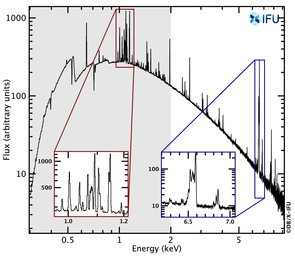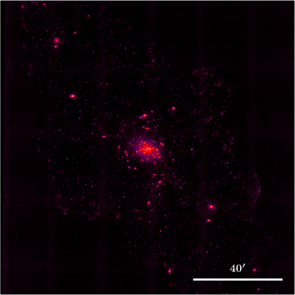Instruments
To achieve the mission's science objectives, Athena carries a payload capable of spatially-resolved X-ray spectroscopy and deep wide-field X-ray spectral imaging with performance greatly exceeding that offered by current X-ray observatories. Its instrumentation will consist of a cryogenic X-ray spectrometer called the X-ray Integral Field Unit (X-IFU), and a Wide Field Imager (WFI).
 |
| Simulated Athena X-IFU observations of the Perseus galaxy cluster. Credit: D. Barret for the X-IFU Consortium |
 |
| Simulated Athena WFI mosaic of the Andromeda galaxy. Credit: N. Vulic |
X-ray Integral Field Unit
The X-IFU will be an advanced, actively shielded X-ray microcalorimeter spectrometer for high-spectral resolution imaging.
The detector will be a large array of absorbers read out by transition edge sensors (TES). The TES microcalorimeter senses the heat pulses generated by X-ray photons when they are absorbed.
The minute temperature increase occurring with the incident photon energy is measured by the sharp change in the electrical resistance of the TES. This must be cooled to a temperature of less than 100 mK and biased into its transition between superconducting and normal states.
Wide Field Imager
The WFI is a silicon depleted p-channel field effect transistor (DEPFET) active pixel sensor camera. It has a large field of view, high count-rate capability and moderate resolution spectroscopic capability.
Each pixel consists of a p-channel MOSFET integrated onto a fully depleted silicon bulk. Electrons generated by the interaction of incident X-ray photons with the bulk material are collected at an internal n-doped gate and laterally constrained to the region below the transistor channel.
This increases the conductivity of the MOSFET proportional to the amount of stored charge and is therefore a measure of the energy of the incident photon.
